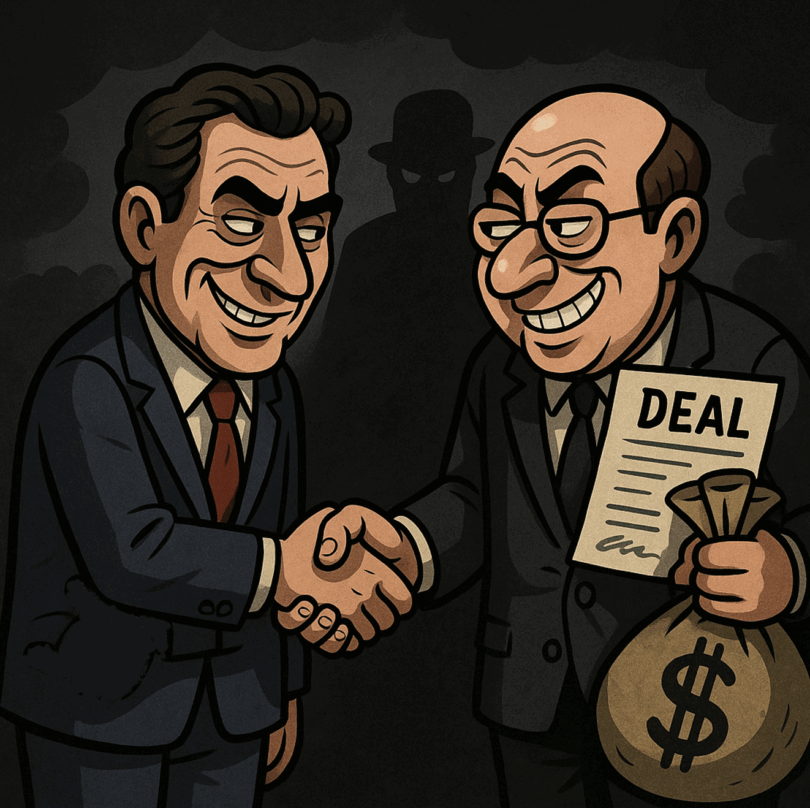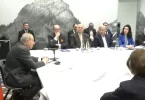On May 27, 2025, Alen Simonyan, the Speaker of the Armenian Parliament made multiple illogical claims. (It is suggested that you enable CC on YouTube and the auto-translate language of your choice. Start at the 50-second mark). These are some of the claims.

The definition of sovereignty includes the ability to govern and regulate political affairs without foreign interference. Since the disintegration of the Soviet Union, all Armenian governments traded Armenian sovereignty for personal gain, as the unrestrained accumulation of wealth appears fundamental to human nature. Since Armenia’s independence, there has been little evidence of a central strategy that does not serve the ruling class and fellow plutocrats. While Armenia was, and still is, surrounded to its east and west by forces bent on reducing Armenia to a footnote of history, it never appeared to have engaged in more than transactional engagement with its geopolitical realities. It attempted to minimize risk to the ruling regime by not making the hard choices that involve a state strategy that transcends regimes.
Any national strategy is defined as calculating objectives, concepts, and resources within acceptable bounds of risk to create outcomes more favorable than might otherwise exist by chance or through the agency of others. A large proportion of such a strategy uses all available resources to achieve otherwise ‘favorable outcomes.’ Like all post-Soviet republics, Armenia viewed resources more as plunder rather than critical elements of national survival. By far, the most crucial human, business, technological, and intelligence-gathering resource Armenia has is its diaspora, demonized by Armenian’s existential enemies and infiltrated and neutralized by the Soviets. All post-Soviet Armenian governments actively resisted utilizing the vast talent of the Armenian diaspora because their success would challenge interests that benefit from maintaining the status quo in Armenia. The competent are not welcomed in a stacked game.
Since the end of the twentieth century, an element of US doctrine has been to reduce Russia’s superpower potential to below a critical level; maps exist showing the Russian Federation disintegrated into about a dozen smaller regions, each run by an oligarch eager to sell off Russia’s natural resources for a song. This policy didn’t care about collateral damage, as witnessed by the Western-sponsored disintegration of Yugoslavia and the eventual NATO bombing of Serbia in 1997; actions aimed to reduce or eliminate Russian influence in the Balkans and the Mediterranean. Western championing of the Georgian Rose revolution resulted in the 2008 Georgian-Russian War that the UN declared as precipitated by Georgian President Saakashvili, hoping Western powers would support his anti-Russia actions; they did not. Policies put forth by the RAND Corporation specifically state all efforts should be made to extend Russia to the point of collapse, something akin to the disintegration of the Soviet Union. This 2019 report is a compendium of existing US and Western policies associated with Russia in practice since the end of the Cold War. The report states explicitly,
“While the principal aim of these policies would be to extend Russia, closer relationships with Georgia, Azerbaijan, or Armenia might yield important secondary benefits for the United States. The geographic position of Azerbaijan makes it a prime location for both intelligence- gathering and deterrence measures relating to Iran, especially because many of Iran’s Kurdish and Iranian populations are concentrated near the Azeri-Iranian border.“
Nowhere in this RAND report is there any consideration given to collateral damage associated with such a policy or how such a policy serves any of the interests of these ‘proxy’ states. Today, we see this policy being played out in Ukraine, with well over one million Ukrainian casualties, millions have left Ukraine, and the national infrastructure is crumbling. During the past year, Georgia refused to open a second suicidal front against Russia, which it borders. This Georgian national self-preservation policy severely curtailed EU integration and added Georgia to the West’s ‘bad guys’ list.
Like many governments throughout history, the current Armenian government came to power due to real, perceived, or amplified deficiencies in the previous regime. The current government, personified by its prime minister, Nikol Pashinyan, came to power supported by Western powers and their NGOs (in Pashinyan’s own words), with the classic mantra, “We will eliminate corruption.” All these elements have the hallmarks of a Color Revolution, in Armenia’s case, the so-called Velvet Revolution. It was clear, early on, that Pashinyan was coming to power with a muffled anti-Russian orientation. Previous Armenian leaders, who Pashinyan blamed for Armenia’s geopolitical and economic depravity, had strong ties with Russia. Russia saw this, and it adjusted its Armenia policies accordingly.
Was there a quid-pro-quo between Pashnyan and the collective West? We don’t know as a fact, but more evidence than not supports the leading hypothesis that the ‘Velveteers’ were convinced that Artsakh must be relinquished, with peace as a result. It took an engineered defeat in the 2020 Second Karabakh War to give the impression to the Armenian people they fought for Artsakh. Such an engineered defeat could not have been a unilateral Armenian policy. The lack of significant infrastructure damage on both sides is telling evidence. The Turkish General Staff ran this war against the Armenians of Artsakh. NATO’s Secretary General Stoltenberg praised NATO’s Turkish ally at the height of the war. Israel, a strategic partner of Azerbaijan, gained 140 km of new border between Azerbaijan and Iran to enhance MOSSAD’s intelligence surveillance and advanced special operations against Iran.
Russia took advantage of this Armenian defeat to place thousands of so-called peacekeeper troops in what was left inhabited by the Armenians of Artsakh at the end of 2020. For Azerbaijan, an Armenian defeat was not enough, as Baku demanded complete control over this region and continued attacking the remaining 120,000 Armenians, engaged in a food and energy blockade. This resulted in the final forced ethnic cleansing of 120,000 Armenians in the fall of 2023. With no mandate remaining, Russian troops left Azerbaijan. Nagorno-Karabakh ceased to be a political tool against both Armenia and Azerbaijan. No Western powers lifted a finger in response to these events, nor did Russia or its so-called peacekeepers intervene. This is not surprising considering Pashinyan’s anti-Moscow position. The result of these actions was a reduced Russian footprint in the Southern Caucasus and no Armenians remaining in Artsakh. Pashinyan blamed Russia for not protecting Armenia and suspended its participation in Moscow’s CSTO (Collective Security Treaty Organization). Other CSTO member states congratulated Azerbaijan on its successful conquest of Artsakh. Effectively exiting the CSTO and blaming Russia for the loss of Artsakh fits nicely into the West’s proxy operations in Armenia. Since 2018, has anything geopolitically transpired in the region been in Armenia’s interest? The answer is no, including over 4,000 Armenian young men who died in this engineered defeat. Naysayers will claim that Artsakh was always within the internationally recognized borders of Azerbaijan, so it had to be released to them. This position assumes several things:
(1) Armenia used all its resources to keep Artsakh Armenian and promote its independence; it did not.
(2) Armenia had to sacrifice the lives of over 4,000 Armenian soldiers, most under 25 years old, in the defense of Artsakh. If it were the case that Armenia had to de jure relinquish Artsakh, why the sacrifice of 4,000 young men; no answer is forthcoming.
(3) Armenia has a master plan all along. In sharp contrast, the Pashinyan government finds itself in an Azerbaijani-directed capitulation spiral, trapped by diplomatic incompetence. Armenian national symbols are being desecrated, religious institutions are being insulted, and Armenia’s constitution is under question, as is history being taught in Armenian schools. If Pashinyan’s ruling party naively thought that peace would follow the abandonment of Artsakh, its inability to deal with the fallout indicates not understanding realpolitik.
It’s one thing to have strategic goals and a methodology to engage strategic actions to reach such goals, yet it is another to jump on the bandwagon of those who brought you to power. Such incompetence is demonstrated daily in the Armenian Parliament as it is becoming clear that a new set of oligarchs are in the formation stage.
This personal interest game is not limited to up-and-coming oligarchs. A road construction company, EuroAsphalt, led by Armenian Parliament Speaker Alen Simonyan’s brother, Karlen Simonyan, secured two government contracts totaling $1.4 million in 2021, prompting allegations of potential conflict of interest and corruption. This small firm, which had minimal capital at its founding in 2018, was awarded contracts to pave rural roads in Armenia. Deputy Armenian Prime Minister Suren Papikyan defended the contracts as transparent. In contrast, civic activists and anti-corruption watchdogs raised concerns about favoritism and urged further scrutiny. The issue has drawn additional attention due to Alen Simonyan’s close ties to Prime Minister Nikol Pashinyan, who vowed to eliminate systemic corruption in Armenia. In 2023, EuroAsphalt went bankrupt; how convenient.
From the United States to Armenia, incompetent leadership defines the 21st century. Anti-Russian and anti-Iranian EU leaders visit Armenia, Armenian diplomats are invited to meetings and conferences across the EU, pledges are made, and weapon purchases (as long as they are not Russian) lacking interoperability are applauded as smart moves. Since 2018, none of these exercises in conspicuous international activity have appeared to be in Armenia’s best interests. Globalist French President Macron is vehemently anti-Russian. He would praise any state who also had similar interests. It is guaranteed that Macron’s bent towards Armenia is not because he might have liked Charles Aznavour’s talent but rather because anything remotely not pro-Russian is in his interest.
Yerevan, Armenia
David Davidian is a Lecturer at the American University of Armenia. He has spent over a decade in technical intelligence analysis at major high-technology firms. He resides in Yerevan, Armenia. A compendium of his articles can be seen on shadowdiplomat.com





